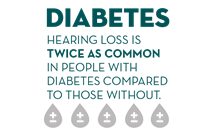
Did you know that hearing loss is twice as common in people with diabetes compared to those without the disease? Experts say that one in three people with diabetes will develop hearing loss!
The cause of diabetes-related hearing loss has been debated for several decades. Researchers theorize that hearing loss results from damage to blood vessels in the inner ear. Unlike other structures in our bodies, the inner ear does not have a backup supply of blood flow, leaving it vulnerable when blood sugar levels become elevated. If the blood vessels are damaged, blood flow is reduced which can cause permanent damage to the structures in the inner ear. Elevated blood sugar levels can also damage the hair cells and nerves surrounding the inner ear.
Researchers have added diabetes to a long list of potential risk factors for developing hearing loss including genetics, aging, noise exposure and ototoxic medication. Otolaryngologist Yuri Agrawal from Johns Hopkins University explained to everydayhealth.com, "Hearing should be considered a diabetes-related complication. Our research suggests a dose-response relationship.” Diabetes-related hearing complications, however, tend to strike earlier than other risk factors.
What can you do to lower your risk?
A healthy lifestyle that includes exercise and a nutritious diet can keep blood sugar levels low and daily blood glucose readings within recommended ranges. Reducing the risk of diabetic-related-health complications will also minimize the risk of developing hearing loss.
Here are a few more suggestions to reduce your hearing loss risk and preserve your hearing:
- Control your blood sugar. Gaining and maintaining tight blood sugar control could help to keep your ears sharp longer.
- Don’t smoke. Smoking speeds hearing loss on its own, but acts as a risk multiplier when combined with other hearing loss risk factors.
- Manage loud noise. Whether you work in a loud environment or some of your hobbies involve loud sounds, make sure to protect your ears.
As the number of people living with diabetes continues to rise, it is estimated that nearly one third of the population will have diabetes by the year 2050. Individuals with diabetes should get routinely screenings of their ears and hearing, as well as the health of their eyes, kidneys and cardiovascular system. Adherence to recommended screening protocols can aid in early identification of any problems and reduce the risk of diabetes-related complications. Diligent management of the disease can delay or even prevent additional health complications.
If you have diabetes, it is important to get your hearing checked annually. Contact our office today to schedule an appointment!
